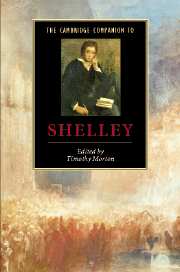Introduction
Published online by Cambridge University Press: 28 January 2007
Summary
Contesting Shelley
'Shelley, the genius, the prophet, Shelley, and Byron, with his glowing sensuality and his bitter satire upon our existing society, find most of their readers in the proletariat; the bourgeoisie owns only castrated editions, family editions, expurgated in accordance with the hypocritical morality of today.' Thus Friedrich Engels intones towards the end of his relentless excoriation of the condition of the working class in England, the double incantation of the writer's name charging the sentence with energy. Shelley continues to polarize people along class lines. I well remember, having been invited to present a BBC radio programme on Shelley's poetry in the early 1990s, being summarily informed after having assembled my list and my introduction that most of the poems I had chosen were not actually by him. My selections were from Queen Mab, Alastor, Prometheus Unbound, and some of the radical lyrics of 1819. It was the latter that were in dispute, ensuring that I did not get to do the show at all. To the blushing eyes of some liberal humanist editors, the representations of starving mothers asking for a bit of food must have been fakes. The idea that he could not have written such things persists two centuries after Shelley himself sent off his ballads and songs for publication, moved by the massacre of a huge crowd of protesters at St Peter's Fields in Manchester by those staunch relics of English hierarchy, the yeomanry cavalry.
- Type
- Chapter
- Information
- The Cambridge Companion to Shelley , pp. 1 - 14Publisher: Cambridge University PressPrint publication year: 2006



